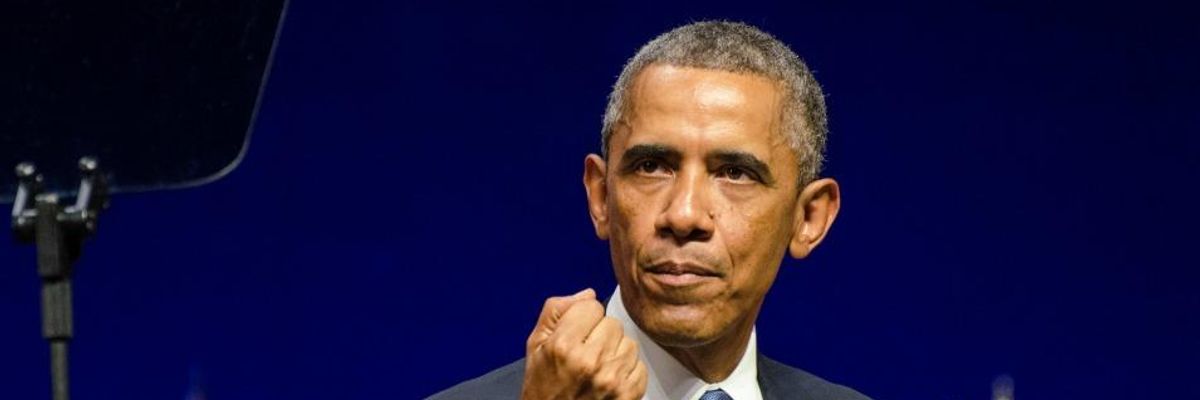Barack Obama's central dilemma last week, when he tried to sell a new war to the American public on the eve of the thirteenth anniversary of 9/11, was to speak convincingly about the wisdom and effectiveness of U.S. foreign policy over the last decade-plus while at the same time, alas, dropping the bad news that it didn't work.
Thus: "Thanks to our military and counterterrorism professionals, America is safer."
Hurray! God bless drones and "mission accomplished" and a million Iraqi dead and birth defects in Fallujah. God bless torture. God bless the CIA. But guess what?
"Still we continue to face a terrorist threat. We cannot erase every trace of evil from the world, and small groups of killers have the capacity to do great harm."
So it's bombs away again, boys--another trace of evil has popped up in the Middle East--and I find myself at the edge of outrage, the edge of despair, groping for language to counter my own incredulity that the God of War is on the verge of another victory and Planet Earth and human evolution lose again.
Obama ended his executive declaration of more war with words that the military-industrial shills have slowly managed to turn into an obscenity: "May God bless our troops, and may God bless the United States of America."
God bless another war?
Tom Engelhardt, writing a few days ago at TomDispatch, called it "Iraq 3.0," noting: "Nowhere, at home or abroad, does the obvious might of the United States translate into expected results, or much of anything else except a kind of roiling chaos. . . . And one thing is remarkably clear: each and every application of American military power globally since 9/11 has furthered the fragmentation process, destabilizing whole regions.
"In the twenty-first century, the U.S. military has been neither a nation- nor an army-builder, nor has it found victory, no matter how hard it's searched. It has instead been the equivalent of the whirlwind in international affairs, and so, however the most recent Iraq war works out, one thing seems predictable: the region will be
further destabilized and in worse shape when it's over."
Obama's speech is addressed to a nation with a dead imagination. Doing "something" about the Islamic State means dropping bombs on it. Bombing runs don't inconvenience a politician's constituents and always seem like stalwart action: a squirt of Raid on an infestation of bugs. They never kill innocent people or result in unintended consequences; nor, apparently, do they provoke an instant sense of horror, the way a beheading does.
Indeed, declarations of war always seem to lift people up. This is because they separate us from the evil that our enemies are committing. Addressing the complexity of others' brutal behavior means facing our terrifying complicity in it--which is asking far too much of any Beltway-entrenched U.S. politician. Obama hasn't broken in any way from his inarticulate predecessor in attempting to exploit the simplistic emotional safe haven of war and militarism.
"How do I respond when I see that in some Islamic countries there is vitriolic hatred for America?" George Bush asked during a press conference a month after the 9/11 attacks (quoted recently by William Blum in his latest Anti-Empire Report). "I'll tell you how I respond: I'm amazed. I'm amazed that there's such misunderstanding of what our country is about that people would hate us. I am--like most Americans, I just can't believe it because I know how good we are."
Obama is trying to extract the same public acquiescence to military aggression from the IS beheadings of two U.S. journalists and a British aid worker as Bush did from 9/11. Bush had the distinct advantage of not having himself--and the disastrous mess he created--as his predecessor. Nevertheless, Iraq 3.0 is going to become a reality, even though bombing Iraq will just strengthen IS and likely open the door to the next multi-year military quagmire.
As David Swanson laments on the website World Beyond War, speaking of the first journalist IS brutally murdered, "James Foley is not a war ad."
"When 9/11 victims were used as a justification to kill hundreds of times the number of people killed on 9/11, some of the victims' relatives pushed back," Swanson writes. Linking to a video in which Foley talks about the hell and absurdity of war with filmmaker Haskell Wexler during the NATO protests in Chicago two years ago, he adds: "Now James Foley is pushing back from the grave."
He invites us to watch Foley talk about "the dehumanization needed before people can be killed, the shallowness of media coverage" and other toxic realities of war that usually don't show up in presidential speeches.
"We cannot erase every trace of evil from the world . . ."
I can't believe I live in a country that still tolerates such simplistic, knife-edged rhetoric. Oh, so much evil out there! The U.S. government, in all its might and purity, has no choice but to go after it with every weapon in its arsenal. What Obama doesn't bother to say, though perhaps in some helpless, futile way he knows, is that engaging in the game of war is always an act of defeat. And the opponents, in their brutal aggression toward each other and everyone else, are always on the same side.

